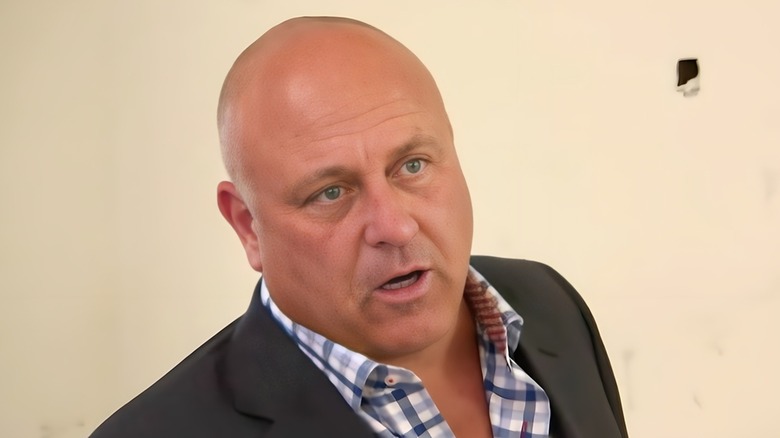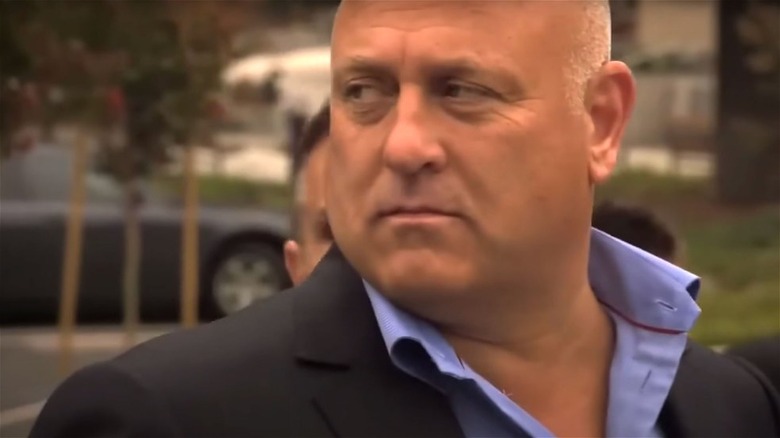Former "Flip It To Win It" Star Sentenced To Prison & Restitution
Could a seemingly harmless reality TV show about flipping houses hide a web of deceit and financial ruin? The story of Charles "Todd" Hill, the former host of HGTV's "Flip it to Win it," reveals a shocking truth: the facade of success can crumble under the weight of greed and fraud.
The Silicon Valley-based real estate entrepreneur, who charmed viewers with his supposed ability to transform dilapidated properties into profitable investments, was sentenced to four years in jail. The sentence, handed down following his conviction, also included an order to repay nearly $10 million to his victims. The charges stemmed from a series of real estate and financial scams that left a trail of devastation in their wake. Hill, now 58, was known as "Mr. Flip it" on the show, which aired in 2014. He was indicted in November 2019 and pleaded guilty on September 2023 to charges including grand theft, operating a Ponzi scheme, and submitting false balance sheets. The impact of his actions was significant, affecting at least 11 victims and involving 18 properties.
| Category | Details |
|---|---|
| Full Name | Charles "Todd" Hill |
| Age | 58 (as of the time of the sentencing) |
| Known For | Host of HGTV's "Flip it to Win it" |
| Location | Los Gatos, California |
| Conviction | Grand Theft, Ponzi Scheme, False Balance Sheets |
| Sentence | Four years in jail |
| Financial Penalty | Ordered to repay nearly $10 million to victims |
| Victims | At least 11 |
| Properties Involved | 18 |
| HGTV Show | Flip it to Win it (2014) |
| Indictment Date | November 2019 |
| Plea Date | September 2023 |
| Reference | Mercury News - Former HGTV star Charles Todd Hill sentenced to 4 years in prison for real estate scams |
The tale of Charles Todd Hill is a cautionary one, serving as a stark reminder that appearances can be deceiving. His HGTV show, "Flip It to Win It," presented a narrative of success and financial acumen. The premise, as it appeared on screen, involved Hill and his team buying rundown properties, renovating them, and then selling them for a profit. The show aired in 2014, providing viewers with a glimpse into the high-stakes world of real estate investment.
However, behind the television facade lay a darker reality. The investigation revealed that Hill engaged in multiple fraud schemes, diverting funds and misleading investors. The promised profits never materialized for his victims, who instead suffered significant financial losses. Overbudget remodels, laundered profits, and the fabrication of false balance sheets were among the methods he employed to conceal his fraudulent activities. This resulted in a complex scheme designed to deceive investors and enrich himself at their expense.
The sentencing in January 2024 marked the culmination of a long legal process, bringing a measure of closure to those who had been victimized by Hill's actions. The courtroom proceedings provided an opportunity for the victims to share their experiences and highlight the devastating impact of his scams. The nearly $10 million in restitution was intended to partially offset the financial harm he inflicted, though it may not fully compensate for the personal and professional devastation suffered by those he defrauded.
Before his foray into reality television, Hill had already been accused of running a Ponzi scheme. Evidence presented during the investigation showed that he had used laundered money to rent an apartment in San Francisco, further illustrating the extent of his illicit activities. This earlier involvement in fraudulent schemes foreshadowed the events that would later unfold, underscoring a pattern of deceit that spanned several years.
The court's decision to impose a four-year prison sentence sends a clear message: those who exploit others for personal gain will be held accountable. It serves as a deterrent and a testament to the importance of ethical conduct, particularly in the world of finance and investment. The victims in this case, some of whom had placed their trust and hard-earned money in Hills hands, were left to grapple with the repercussions of his actions.
The case of Charles "Todd" Hill is more than just a tale of financial crime. Its a reflection of the allure and the dangers of the real estate market, the seductive power of television, and the risks associated with placing trust in individuals who may not be who they seem. The case serves as a critical reminder to always conduct thorough due diligence when making investments and to be vigilant against potential fraudsters who use charm and charisma to deceive. The HGTV stars fall from grace underscores the importance of transparency and accountability in all business dealings and the need to be wary of individuals promising unrealistic returns.
The investigation into Hill's activities uncovered a sophisticated network of deceit. Prosecutors detailed how Hill systematically exploited his victims, promising them substantial returns on their investments while diverting their funds for his personal use. The overbudget remodels were a key component of this deception, as they created an illusion of activity while masking the financial losses. Furthermore, the laundering of profits allowed him to conceal the source of his ill-gotten gains and maintain the appearance of a legitimate business operation.
The sentencing of Charles Todd Hill is not just a legal outcome; it is a societal commentary on the impact of financial fraud and the importance of holding individuals accountable for their actions. His case has brought into sharp focus the devastation caused by such schemes. The victims experiences, shared during the court proceedings, highlighted the deep emotional, psychological, and financial scars left behind. The impact of these scams reaches far beyond monetary losses, often leading to significant stress, anxiety, and a profound loss of trust.
The order for Hill to repay close to $10 million to his victims is an attempt at restorative justice, an effort to mitigate the financial harm he caused. It may not fully repair the damage done but represents a critical step towards acknowledging the losses and providing a measure of compensation. However, for many victims, the financial restitution is only part of the healing process, as they must also grapple with the betrayal and the emotional toll of the experience.
The indictment and subsequent conviction of Charles Todd Hill have prompted conversations about the need for greater regulatory oversight within the real estate investment industry. The case has underscored the importance of protecting investors and ensuring that financial professionals operate with integrity and transparency. The call for reforms reflects a growing awareness of the need for measures to prevent similar schemes from occurring in the future. This case stands as a cautionary tale, reminding the public that the world of real estate, like any other investment field, is vulnerable to deceptive practices and unethical actors.
The involvement of a reality TV personality in these fraudulent activities adds an extra layer of complexity to the case. The show, "Flip it to Win it," provided a platform for Hill to project an image of success and expertise, an image that was meticulously crafted to garner the trust of both viewers and potential investors. This highlights the power of media in shaping perceptions and the potential for individuals to exploit that power for their personal gain. The shows popularity and Hills charisma likely played a role in attracting investors and facilitating his fraudulent schemes. The case is a testament to the ease with which individuals can construct an image and exploit it to engage in criminal activities.
The fact that Hill admitted to his crimes further emphasizes the gravity of the situation. His guilty plea to grand theft and other charges signifies an acknowledgment of the harm he caused and a recognition of the strength of the evidence against him. While the plea may offer a sense of closure to the victims, it also serves as a stark reminder of the devastating consequences of financial fraud. The sentencing, and the accompanying financial penalties, serve as a form of retribution, aiming to punish Hill for his actions and send a message to others considering similar illegal activities.
The broader implications of the Charles Todd Hill case extend beyond the individuals directly affected. It highlights the need for greater awareness and vigilance among investors, as well as a deeper scrutiny of financial transactions. The case is a valuable learning tool for anyone involved in real estate investment or other financial endeavors, emphasizing the importance of due diligence and the necessity of verifying the legitimacy of investment opportunities. It serves as a reminder of the potential for fraud, and the importance of adopting a critical mindset when evaluating financial claims and promises.
The story of Charles Todd Hill serves as a compelling narrative about the darker side of ambition and the consequences of financial misconduct. It's a reminder that appearances can be deceptive, and the pursuit of wealth should never come at the expense of ethical behavior and legal obligations. The victims of Hill's schemes are now left to pick up the pieces, navigating the complex emotional, financial, and professional consequences of his actions. This case underscores the fragility of trust and the importance of holding individuals accountable for their actions.
The swiftness with which justice was served in this case highlights the efficiency of legal proceedings in certain areas. The indictment in November 2019 and the guilty plea in September 2023 show the ability of law enforcement agencies and the judicial system to hold perpetrators accountable for their financial crimes. The timeline demonstrates a dedicated effort to gather evidence, build a strong case, and bring Hill to justice. This efficiency is a testament to the commitment of investigators and prosecutors to protect victims of financial fraud and uphold the principles of law.
The sentencing also sends a clear signal to other potential fraudsters. The four-year prison sentence and the order to repay nearly $10 million serve as a powerful deterrent against similar schemes. The legal outcome underscores the risks and consequences associated with financial misconduct, hopefully preventing future instances of this type of crime. The case highlights the commitment of the legal system to take seriously and punish fraudulent activities, setting a clear standard for ethical conduct.
The impact on the 18 homes involved is another crucial facet of the case. These homes were not just investment properties; they represented the lives, dreams, and potential financial futures of various homeowners and investors. The overbudget remodels and the diversion of funds meant that some projects were left incomplete or poorly executed, creating further financial strain and stress. The destruction of the financial integrity of these properties underscores the systemic nature of the fraud, demonstrating how one individual's greed can impact so many others.
The aftermath of Hill's actions has left a lasting impact on the victims, who are now struggling to rebuild their financial lives. The process of recovering from a financial fraud can be a long and difficult one, requiring not only monetary compensation but also emotional support. The victims may have to navigate complex legal processes, deal with debt and credit issues, and rebuild their trust in financial institutions. The case illustrates the importance of providing resources and support for victims of financial crime, assisting them in their journey to recovery.
The "Flip It to Win It" saga, therefore, serves as a chilling reminder that the promises of reality TV, in particular, should be taken with a grain of salt. The story showcases the vulnerability of the public to appealing personalities and clever marketing tactics. The audience's trust, so readily bestowed upon a familiar face, was betrayed, and the consequences were financially and emotionally devastating. The case is a timely reminder of the need to verify information, scrutinize financial claims, and demand transparency in all business dealings. It also serves as a stark warning to those tempted to leverage their public persona for illicit gain.


